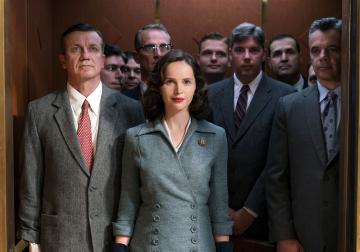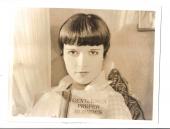'On the Basis of Sex' lionizes Justice Ruth Bader Ginsburg
I had a dream — actually, a dystopian nightmare — about American movie theaters of the future, based on our increasingly extreme political polarization: We’ll soon be greeted at the multiplex by ushers like the ones at a church wedding, but instead of asking, “Friend of the bride or groom?” they’ll ask, “Friend of Trump or Alexandria Ocasio-Cortez?”
Depending on your answer, you will then be directed to the right escalator (for Clint Eastwood’s new film) or the left one (for “Vice” or the new Michael Moore documentary) — with security guards armed with AR-15s stationed in between.
If that’s the case, you’ll want to take the left escalator to see “On the Basis of Sex” — a truly beguiling and inspirational biopic of the life of U.S. Supreme Court Justice Ruth Bader Ginsburg.
Part love story, part courtroom drama, the film introduces us to tiny Ruth (Felicity Jones) and tall husband Marty (Armie Hammer) in 1956 when they were both studying at Harvard Law School — she being one of a mere nine women in her class.
“Women are really too emotional to be lawyers” is the prevailing (male) view — especially women who are wives and mothers.
- Starring: Felicity Jones, Armie Hammer, Justin Theroux.
- Rating: PG-13 for some language and suggestive content.
But Ruth was a fierce competitor at everything — even charades — as well as marriage. She insists on being called “Mrs.” Ginsburg — not “Ms.” or “Miss” Bader. Her story, in a melodramatic sense, is almost a “Star Is Born” scenario: When Marty develops cancer, she rises — no, roars — to the occasion, bolstering his spirits and helping him complete his crucial law school assignments.
Disappointed but undaunted when systemic sexism deprives her of a law firm job, she takes a teaching position at Rutgers University as Marty works at a big New York partnership.
One night at home he tosses a case to her for help — a seemingly minor one, Moritz vs. Commissioner of Internal Revenue, in which an unmarried man was denied a $600 tax deduction for the care of his invalid mother. The IRS code restricted that tax break to women, widowers or husbands whose wives were incapacitated.
Sex-based caregiver deductions? So what else is new in 1972? It’s an era when boys can’t be nurses or flight attendants, and girls are told they should only be nurses, secretaries or teachers. Some 20,000 pages of the federal statutes concern laws that distinguish between genders.
Taking on the task of challenging them is dubious and daunting, even to crusty feminist Dorothy Kenyon (Kathy Bates), to whom Ruth appeals for help.
“The country isn’t ready,” Kenyon tells her. “Change minds first. Then change the law.”
Ginsburg’s daughter Jane (Cailee Spaeny) works for that, and Kenyon helps convince ACLU legal director Melvin Wulf (Justin Theroux) to join the litigation — in the film.
In fact, both of those characterizations are largely fictionalized.
First-time screenwriter Daniel Stiepleman turns out to be Justice Ginsburg’s nephew! His simplistic storytelling is predictably more concerned with hagiographic reverence than with his prickly aunt’s parental and personal flaws. But give him credit for including the moment when Ruth’s secretary suggests changing “on the basis of sex” to “on the basis of gender” in her brief — and for a fabulous Ivy League putdown: When fusty old dean Erwin Griswold (Sam Waterston) congratulates her for “making good use of your Harvard Law education,” she replies, “Actually, what I’m doing now I learned at Columbia.”
Director Mimi Leder, much Emmy-decorated for her “ER” and “West Wing” episodes, rises above the narrative deficiencies and schmaltz by the sheer sincerity of her own — and her star’s — approach. Felicity Jones (Oscar-nominated for “The Theory of Everything” in 2014) puts a credibly human face on a legal cultural icon, embodying her with enormous conviction and aplomb.
In the climactic finale at the 10th Circuit Court of Appeals, Ruth and Marty split their argument time before the panel. It’s perhaps not a spoiler to tell you this was her first of many cases — including Reed v. Reed, which extended the 14th Amendment’s Equal Protection Clause to women for the first time — that changed a legal landscape hitherto stuck in the pre-feminist past.
Such a brilliant ploy, using discrimination against men to get women’s equality. Such a well-deserved appointment to the Supreme Court in 1993, by a 96-3 vote — compared with the most recent appointee’s contentious 50-48 confirmation.
Such a timely movie, in view of her current frail state of health.
My favorite exchange in the film:
“The word ‘woman’ does not appear even once in the U.S. Constitution,” a judge tells her.
“Nor does the word ‘freedom,’ Your Honor,” she replies.
Post-Gazette film critic emeritus Barry Paris: parispg48@aol.com.







